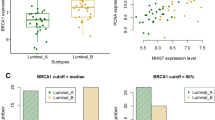Abstract
The objective of this study was to investigate the possible association between the expression of transforming growth factor beta-1 (TGF-β1) and breast cancer type2 susceptibility protein (BRCA2) with clinical factors in breast cancer. TGF-β1, BRCA2, human epidermal growth factor receptor2 (HER2), estrogen receptor, and progesterone receptor protein levels were measured in 67 samples from breast cancer patients by immunohistochemistry. The expression of these proteins was correlated with various clinical factors including age, pathohistological grade and status of axillary lymph node implication. TGF-β1 and BRCA2 were expressed in breast cancer tissues and expression of HER2 and TGF-β1 was significantly correlated with BRCA2. The authors conclude that elevated expression of BRCA2 correlates with TGF-β1 and HER2 in breast cancer and these three factors act in synergy to promote cancer. Thus, detection of both TGF-β1 and BRCA2 may therefore assist in the prognosis and treatment of breast cancer.

Similar content being viewed by others
References
Todorovic-Rakovic, N. (2005). TGF-beta 1 could be a missing link in the interplay between ER and HER-2 in breast cancer. Medical Hypotheses, 65, 546–551.
Mobus, V. J., Moll, R., Gerharz, C. D., Kieback, D. G., Merk, O., et al. (1998). Differential characteristics of two new tumorigenic cell lines of human breast carcinoma origin. International Journal of Cancer, 77, 415–423.
Kidd, L. R., Brock, G. N., VanCleave, T. T., Benford, M. L., Lavender, N. A., et al. (2010). Angiogenesis-associated sequence variants relative to breast cancer recurrence and survival. Cancer Causes and Control, 21, 1545–1557.
Bornstein, S., White, R., Malkoski, S., Oka, M., Han, G., et al. (2009). Smad4 loss in mice causes spontaneous head and neck cancer with increased genomic instability and inflammation. Journal of Clinical Investigation, 119, 3408–3419.
Hueman, M. T., Stojadinovic, A., Storrer, C. E., Foley, R. J., Gurney, J. M., et al. (2006). Levels of circulating regulatory CD4 + CD25 + T cells are decreased in breast cancer patients after vaccination with a HER2/neu peptide (E75) and GM-CSF vaccine. Breast Cancer Research and Treatment, 98, 17–29.
Kokkinakis, D. M., Liu, X., Chada, S., Ahmed, M. M., Shareef, M. M., et al. (2004). Modulation of gene expression in human central nervous system tumors under methionine deprivation-induced stress. Cancer Research, 64, 7513–7525.
Yang, D. C., Elliott, R. L., & Head, J. F. (2002). Gene targets of antisense therapies in breast cancer. Expert Opinion on Therapeutic Targets, 6, 375–385.
Tamura, J., Nakamura-Yamamoto, T., Nishimura, Y., Mizumoto, S., Takahashi, J., et al. (2010). Synthesis of the glycosaminoglycan-protein linkage tetraosyl peptide moieties of betaglycan, which serve as a hexosamine acceptor for enzymatic glycosyl transfer. Carbohydrate Research, 345, 2115–2123.
Chenevix-Trench, G., Milne, R. L., Antoniou, A. C., Couch, F. J., Easton, D. F., et al. (2007). An international initiative to identify genetic modifiers of cancer risk in BRCA1 and BRCA2 mutation carriers: The Consortium of Investigators of Modifiers of BRCA1 and BRCA2 (CIMBA). Breast Cancer Research, 9, p. 104.
Powell, W. C., Hicks, D. G., Prescott, N., Tarr, S. M., Laniauskas, S., et al. (2007). A new rabbit monoclonal antibody (4B5) for the immunohistochemical (IHC) determination of the HER2 status in breast cancer: Comparison with CB11, fluorescence in situ hybridization (FISH), and interlaboratory reproducibility. Applied Immunohistochemistry Molecular Morphology, 15, 94–102.
Zhu, L., Loo, W. T., Cheng, C. W., & Chow, L. W. (2006). Possible predictive markers related to micro-metastasis in breast cancer patients. Oncology Reports, 15, 1217–1223.
Kim, S. J., Park, J. H., Kim, K. H., Lee, W. R., Chang, Y. C., et al. (2010). Bee venom inhibits hepatic fibrosis through suppression of pro-fibrogenic cytokine expression. American Journal of Chinese Medicine, 38, 921–935.
Song, C. G., Hu, Z., Yuan, W. T., Di, G. H., Shen, Z. Z., et al. (2006). BRCA1 and BRCA2 gene mutations of familial breast cancer from Shanghai in China. Zhonghua Yi Xue Yi Chuan Xue Za Zhi, 23, 27–31.
Antoniou, A. C., Goldgar, D. E., Andrieu, N., Chang-Claude, J., Brohet, R., et al. (2005). A weighted cohort approach for analysing factors modifying disease risks in carriers of high-risk susceptibility genes. Genetic Epidemiology, 29, 1–11.
Author information
Authors and Affiliations
Corresponding author
Rights and permissions
About this article
Cite this article
Li, J., Zhu, H., Chen, T. et al. TGF-β1 and BRCA2 Expression are Associated with Clinical Factors in Breast Cancer. Cell Biochem Biophys 60, 245–248 (2011). https://doi.org/10.1007/s12013-010-9146-4
Published:
Issue Date:
DOI: https://doi.org/10.1007/s12013-010-9146-4




